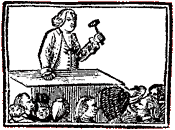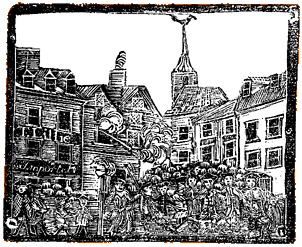The Rev. Edward Jackson, the minister accused of fathering Hincher’s child, enjoyed his vindication in August 1753 for only about a year. He died on 24 Sept 1754 at the age of fifty-four. His supporters blamed the stress of fighting off those rumors for his death. Ironically, Jackson’s sickly rival, the Rev. John Fox, outlived him, dying on 12 Dec 1756 at age seventy-eight.
Among Jackson’s enemies, Jonathan Poole, the Woburn justice of the peace, died in 1755.
Roland Cotton moved out of Woburn in 1754, settling in Sandwich, where his father had been the minister. His new town elected him to the Massachusetts General Court, which in 1759 once again chose him as its Clerk. In 1760 he married Deborah Mason of Boston. However, Cotton’s reputation never recovered after the scandal in Woburn, and his behavior became more grandiose. Commenting in his diary in July 1767, John Adams wrote:
Cotton is insane, wild. His Proposal of giving his House and Farm at Sandwich to the Province, is a Proof of Insanity. He has Relation that are poor. Jno. Cotton [his brother, a minister in Newton?] is now poor enough. He has a Brother Josiah Cotton the Minister whom he procured to be removed to Woburn, and thereby to be ruin’d, who is very poor, maintained by Charity. Roland was Josiahs ruin; yet he did not choose to give his Estate to Josiah.Boston merchant William Molineux was more blunt, telling Cotton that he was a “forsworn Rascall,” that “all the boys in…Boston have made Songs of You…being a perjured Villain and sing them about the streets.” Cotton sued Molineux for libel, demanding £2,000 in damages. In 1768 a Superior Court jury decided that Cotton’s reputation was worth £10 and court costs.
Besides his Behaviour at Boston upon that occasion, was wild. His sitting down at the Council Table with his Hat on and Calling for his Deed and a Justice to acknowledge it, when the Council was sitting.
By then Roland Cotton had lost the post of House Clerk to a new representative from Boston: Samuel Adams. (The salary that came with that post was probably Adams’s main income in the following years.) During the protests against the Massachusetts Government Act in 1774, Cotton at first refused to sign a declaration by his county’s justices of the peace not to act under the new law. Then a crowd pressured him personally, and he agreed. He died on 16 May 1778, aged seventy-six.
Finally, there was the Rev. Josiah Cotton. After Jackson’s death and his brother’s departure, he sensed that his congregation wished to reunite with Woburn’s first parish. Cotton resigned in July 1756, and then spent some time seeking a new pulpit in the new towns of New Hampshire. In 1759, he became the first minister for the town of Sandown, incorporated only three years before. (The following year, Woburn’s first and third parish finally completed the financial negotiations to reunite.)
There’s no evidence to support John Adams’s lament that Josiah Cotton was “maintained by Charity”; he owned significant property in New Hampshire. But of course living in such a small, remote town was far from luxurious. Nonetheless, the Rev. Mr. Cotton got along with his congregants in Sandown better than at his first two postings. He died in 1780 and was fondly remembered.
(Image above courtesy of the David Rumsey Map Collection.)









